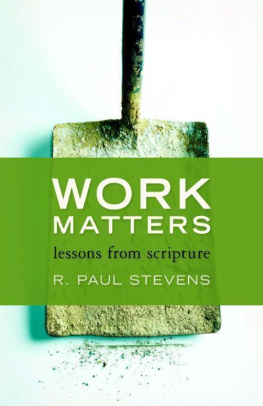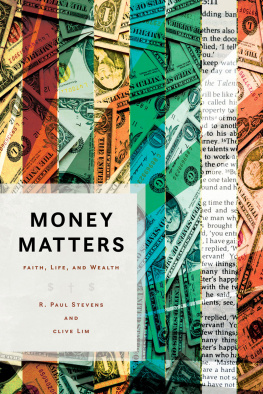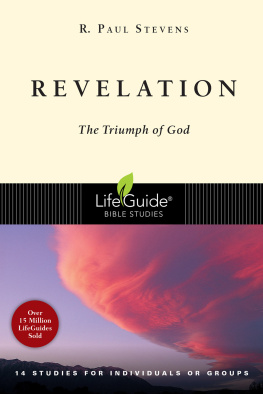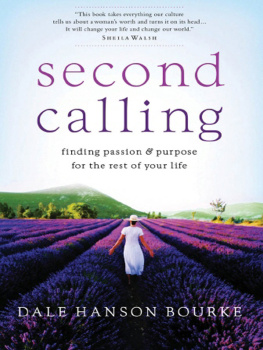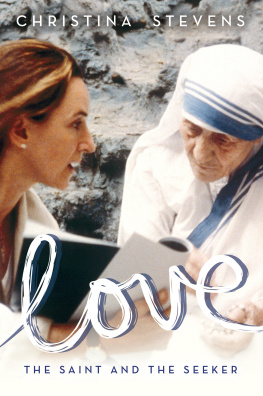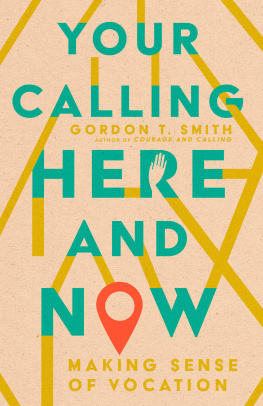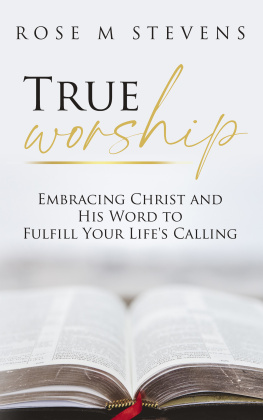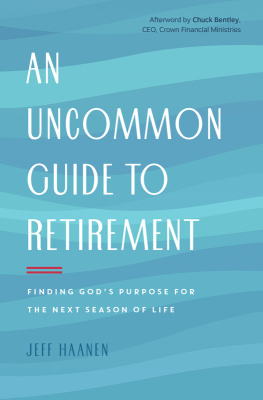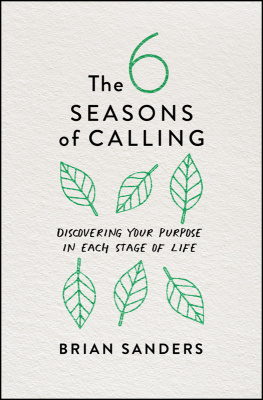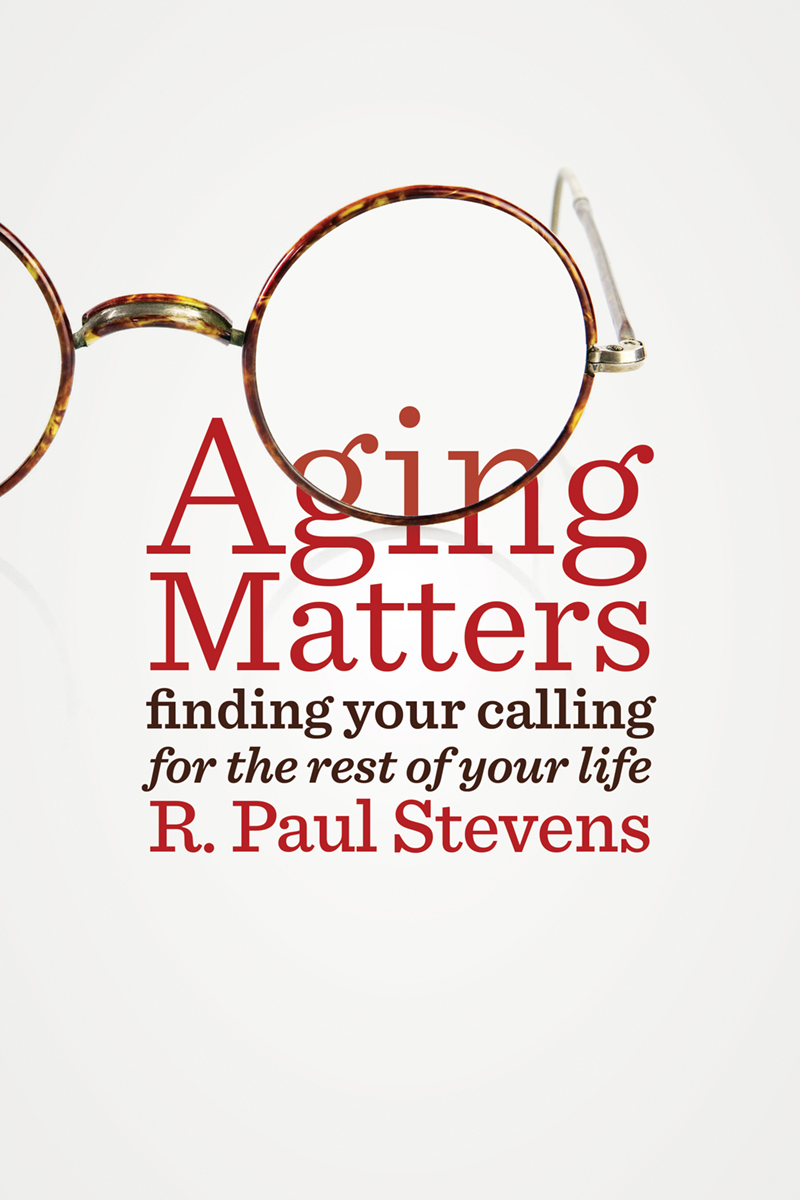Aging Matters
Finding Your Calling
for the Rest of Your Life
R. Paul Stevens
William B. Eerdmans Publishing Company
Grand Rapids, Michigan / Cambridge, U.K.
2016 R. Paul Stevens
All rights reserved
Published 2016 by
Wm. B. Eerdmans Publishing Co.
2140 Oak Industrial Drive N.E., Grand Rapids, Michigan 49505 /
P.O. Box 163, Cambridge CB3 9PU U.K.
www.eerdmans.com
Printed in the United States of America
Library of Congress Cataloging-in-Publication Data
Names: Stevens, R. Paul, 1937- author.
Title: Aging matters : finding your calling for the rest of your life / R. Paul Stevens.
Description: Grand Rapids, Michigan : Eerdmans Publishing Company, 2016. |
Includes bibliographical references and index.
Identifiers: LCCN 2015045472 | ISBN 9780802872333 (pbk. : alk. paper)
eISBN 9781467445467 (ePub)
eISBN 9781467444996 (Kindle)
Subjects: LCSH: Older Christians Religious life.
Classification: LCC BV4580 .S702 2016 | DDC 248.8/5 dc23
LC record available at http://lccn.loc.gov/2015045472
Scriptures taken from the HOLY BIBLE: TODAYS NEW INTERNATIONAL VERSION. TNIV. Copyright 2001, 2005 by International Bible Society. Used by permission of The Zondervan Corporation and the International Bible Society.
Contents
Success in retirement depends in great measure on the way we lived beforehand.
Paul Tournier
Old age was not a defeat but a victory, not a punishment but a privilege.
Abraham Heschel
At seventy-eight years of age I am not quite in the oldest-olds category but certainly on the way. According to recent studies even old age now is sub-categorized. Young-olds are sixty to sixty-nine; old-olds are seventy to seventy-nine; and oldest-olds are eighty-plus.
Here is another question: Does aging increase our spirituality, that heart for transcendence, or soul search? Are there special vices and virtues in aging, and spiritual disciplines to enable us to grow spiritually in our most senior years? What is our legacy? What are we leaving behind? And how are we to think about and live towards death, as there is a one hundred percent certainty that we will die? Nobody fails this one. But that raises the question of the next life and whether it would be a good thing to prolong our life indefinitely on earth. These are the haunting questions we will take up in this book.
Frankly, I am writing for myself, but also for you, my reader, who may also be caring for aging parents. If you are a social worker or care giver, wanting to understand what aging means and how to go about it fruitfully, how to help others face it and thrive through it, this is for you. Since this book is about aging it is, truly, about everyone. I will be approaching these questions from the perspective of a Christian faith, and I will be drawing on the Scriptures of the Jewish and Christian people groups. There are rich resources for people of other traditions or some resources from people who have no faith at all. But there is a further reason for this book.
The Gray Tsunami
There is no question that we have a population bulge in the seniors group that, on the population charts, is like an awkwardly large animal going through the long neck of snake. In the late Middle Ages those who survived to twenty could on average live to around fifty. In 1992, 12 percent of the U.S. population something over thirty million people were over sixty-five. By the best estimate, 18 percent of us will be that old by 2020. By 2040 one out of four North Americans will be sixty-five or over. In 1776, a child born in the United States had an average life expectancy of thirty-five. By the middle of the twenty-first century, it is expected in some generous estimates that men will live to 86 and women to 92. These striking examples of mid-life and late-life fruitfulness do not ameliorate the double message seniors and aging people hear from society.
How People and Society View Aging
On the one hand classic liberal economists tell us that population control and a declining birth rate are important for a healthy economy. But now, with fewer working persons to support the elderly, there is a crisis looming. Even the government pension plans, which are really in-and-out bank accounts, are in serious trouble because fewer are contributing to them and more are taking money out. So today older persons are often viewed as frail, sick, disabled, powerless, sexless, passive, alone, unloved, unable to learn, and burdensome. Americans have come to view aging not as a fated aspect of our individual and social existence, but as one of lifes problems to be solved through willpower, aided by science, technology, and expertise. People fear aging partly because they fear death. The logic is circular. It is mostly old people who die. So we fear getting old because we will die. So aging is a paradox. Everyone wants to live longer, but none of us wants to get old.
One thing that is apparent in considering ancient texts and cultural artifacts is this: old age and death, prior to what we call the modern era, were not clearly correlated as they are for us. We put death as the logical conclusion of a long life but the ancients, and even the early Christians, as well as people in much of the majority world, did not expect necessarily to live until old age. In this vein Augustine said, No one has died who was not going to die at some time, and the end of life reduces the longest life to the same conclusion as the shortest.... What does it matter by what kind of death life is brought to an end.
So in this book we will first of all approach the question of aging in terms of calling or vocation. We will consider reframing retirement as a positive experience. We will ask whether we are supposed to work until we die, and how we should work. We will consider how we discern our calling for the rest of our lives. In this context we will note the many narratives and teachings in the Hebrew and Greek Scriptures as they relate to aging.
In the second section we will consider spirituality. We will consider whether the aging process itself is a spiritual discipline, a spiritual journey, but we will also ask what vices and virtues are uniquely associated with aging.
In the third section we will consider leaving a multifaceted legacy. We will consider how to prepare for death and what there is on the other side.
In all this I will be presenting aging as a time of potential fruitfulness. A Jewish rabbi points to some exceptional examples of generativity in old age:
Giuseppe Verdi composed Otello at age seventy-three and Falstaff when he was approaching eighty. Thomas Mann wrote Dr. Faustus and Confessions of Felix Krull , Confidence Man after age seventy, while Picasso was producing masterpieces into his nineties. Architect Frank Lloyd Wright began his most creative work at age sixty-nine; philosopher Alfred North Whitehead published his most influential works after sixty-five; and the mind of the scientist-visionary Buckminster Fuller was teeming with creative innovation at age eighty.
Few of us will be this creative. But all of us can approach aging with a positive attitude and seize the special opportunities which this new situation affords. And we will explore these.
What You Can Gain from This Book
- Perspective seeing advancing years as a process of maturing that is laden with new opportunities, including the opportunity to reframe the experience of retirement.
- Hope recognizing that faith enables us to see an ultimate future that is even better than the past.
- Guidance in discovering a refined sense of life purpose and meaning that is our calling, our vocation.


